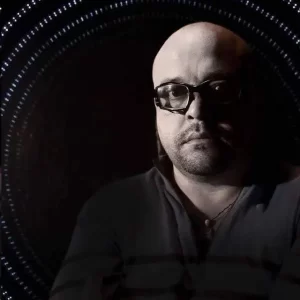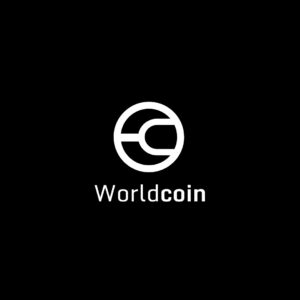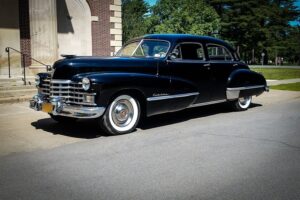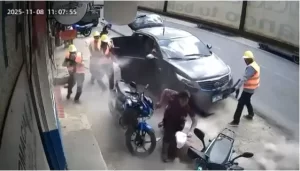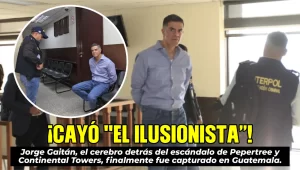Cartel de los Soles is a state-embedded network, with Maduro’s military and officials accused of driving and protecting the cocaine trade

Cartel de los Soles, translated as Cartel of The Suns, isn’t a cartel in the traditional sense.
It’s a web of Venezuelan military, intelligence and political elites accused of taxing, protecting and moving cocaine with state resources.
With parts of Maduro’s government deeply enmeshed in the drug trade, the lines between state power and organised crime have been blurred.
Dr César Alvarez, from Charles Sturt University, told The Sun: “Without a doubt, the leader of Cartel de los Soles is Nicolás Maduro.
“The involvement of the highest-ranking members of his military has been clearly demonstrated that not only government officials, but all the leaders from other criminal groups, not only in Venezuela but in Colombia, have been clearly established.”
US prosecutors first indicted Maduro in 2020 on narco-terrorism charges, accusing him and senior officials of conspiring with Colombia’s FARC guerrillas to “flood” the United States with cocaine.
The case alleges Venezuela’s state institutions — from the military and intelligence services to the judiciary — were weaponised to enable multi-ton shipments and shield traffickers from prosecution.
Maduro denies the charges and calls them politically motivated.
But a recent guilty plea by Hugo “El Pollo” Carvajal, the regime’s former intelligence chief, bolstered claims that elements of the state apparatus directly facilitated cocaine flights and armed the FARC.
His comments come as Donald Trump declared war on the cartels, reportedly moving US naval and air assets closer to Venezuelan shores in a bid to eventually seize ports and airfields in the Latin American country.
In recent weeks, tensions between Washington and Caracas have reached their most dangerous point in years.
Trump escalated the fight beyond rhetoric, declaring the US in a “non-international armed conflict” with cartel groups and cutting any sort of diplomatic contact with the country.
That rare legal framing, combined with designating several cartels and Tren de Aragua as foreign terrorist organisations, gives Washington broad wartime powers to strike, detain and kill suspected traffickers without trial.
Stealth F-35s, B-52 bombers, Reaper drones, eight warships and even a nuclear-powered submarine are lurking off Maduro’s coast.
Some 10,000 troops, military helicopters and intelligence assets from the CIA are also keeping a close eye on Venezuela, with Pentagon planners reportedly preparing contingencies to seize ports and airfields if ordered.
This week, Trump also sent America’s deadliest warplanes to Venezuela’s doorstep.
Two B-1B Lancer bombers – each capable of unleashing 75,000lb of ordnance – flew from Texas on Thursday, cutting close to Venezuelan airspace in a thunderous show of force.
Meanwhile, Maduro has made a public plea for calm after Trump warned that US forces were ready to carry out strikes on Venezuelan soil if his regime continued shielding drug traffickers.
The Pentagon confirmed at least seven drug-smuggling vessels destroyed in recent weeks off Venezuela’s coast, with dozens of suspected traffickers killed.
“There are few boats traveling on the water, so now they’ll come in by land to a lesser extent, and they will be hit on land also,” Trump said, hinting that US ground raids could follow.
The embattled Venezuelan dictator, visibly shaken, appealed directly to Trump this week.
“Yes peace, yes peace forever, peace forever. No crazy war, please!” Maduro said before a cheering crowd of regime-aligned unions.

But the plea did little to disguise his fear.
The tyrant has been boasting that Venezuela possesses 5,000 Russian-made Igla-S missiles positioned across the country, vowing to defend its skies.
And inside Caracas, intelligence reports suggest Hezbollah militants, Colombian guerrillas, and Cuban special forces are embedded with Maduro’s security apparatus — a sign, analysts say, that the embattled dictator is preparing for a siege.
America’s moves, Alvarez said, could rattle Maduro’s criminal empire — but dismantling it will take time.
Alvarez says Tren de Aragua, another major Venezuelan criminal organisation, began as a small prison gang around 2013–2014, never intended to become the sprawling multinational network it is today.
“People think that it’s relatively a new organisation,” he said.
“Tren de Aragua was born around 2013, 2014, and it grew from a relatively small gang that was being run from prison.”
Originally dealing in extortion, arms and drug smuggling, it evolved rapidly.
“It was never intended to be, from the very beginning, a transnational or international drug trafficking syndicate,” Alvarez says.
“But its evolution and the speed at which these groups started to grow is remarkable.”
Tren de Aragua’s growth was fuelled by years of impunity inside Tocorón prison, where gang leaders operated openly from a compound that featured bars, swimming pools and even a zoo.
Authorities claimed to have “dismantled” the group after storming the facility in September 2023, but its networks have since been detected across Chile, Peru, Colombia, Mexico and beyond — often embedded in migrant routes and informal economies.
Analysts say that while there is no formal policy of state protection, entrenched corruption and weak prison oversight allowed the gang to flourish, pointing to systemic complicity even if Maduro’s inner circle does not directly command it.
The Cartel de los Soles — literally “Cartel of the Suns”, a nod to the insignia of Venezuelan military generals — is not a traditional cartel, Alvarez explains.
It’s a broad network of military and political elites facilitating cocaine trafficking since the 1990s.
“The term ‘cartel’ is used to describe this network of the Venezuelan military and political elites being involved in cocaine trafficking,” he said
“When the president of a country like Venezuela has been indicted by the American government for this participation and this leadership in this group, it tells you about the remarkable influence and the worrying situation when it comes to democracy and governance.”
Experts caution that Cartel de los Soles is less a single, top-down organisation than a fragmented patronage network — with officials taxing, protecting or directly handling cocaine shipments in exchange for loyalty and profit.
That murky structure complicates efforts to dismantle it: even if Maduro denies involvement, the network’s reliance on state power for cover and logistics means corruption is baked into Venezuela’s institutions.
According to Alvarez, Maduro’s regime actively protects both Cartel de los Soles and Tren de Aragua.
The network stretches beyond Latin America — with money laundering operations running through West Africa, Turkey, and Iran.
“It speaks volumes about how deeply entrenched corruption and criminality have taken control of the democratic process in Venezuela.”
While exact figures are impossible to pin down, Alvarez says the cocaine trade driven by Colombia and Venezuela is enormous — easily worth tens or even hundreds of billions annually.
Colombia now produces nearly 300,000 hectares of coca crops, yielding around 3,000 metric tonnes of cocaine each year.
“If you look at the numbers, one kilo of cocaine produced in Colombia can cost around $2,000. That same kilo in New York is perhaps $50,000, and in Australian shores, about $200,000,” he explained.
By his estimate, Cartel de los Soles is involved in more than half of all cocaine trafficking activity in the region, making it “one of the most significant actors in Latin America for sure.”
As US warships move closer to Venezuelan waters, Alvarez believes the Trump administration’s offensive will unfold in three phases — short, mid, and long term.
“In the short term, the direct and clear and determined messaging from the US administration will definitely have an effect on these smuggling operations,” he said.
“If we are witnessing live activity driven by drones, where those speed boats and semi-submergibles are being attacked directly… that will create a deterrence effect.”
In the mid-term, internal cracks may start to show.
“There will be an increasing amount of pressure, particularly to hand over President Maduro to the US administration in order to claim that award of $50 million that is now put on his head,” Alvarez said.
“That pressure will create tension and friction within the ranks of the cartel.”
Over the long term, Alvarez predicts a potential regional reset.
“If the US government plays this correctly over the next three years, it will create an avenue for stabilising the security situation in the region.
“New governments in Colombia, Chile and Peru may be more inclined to apply pressure on the Maduro regime to make sure it comes to a full stop.”







